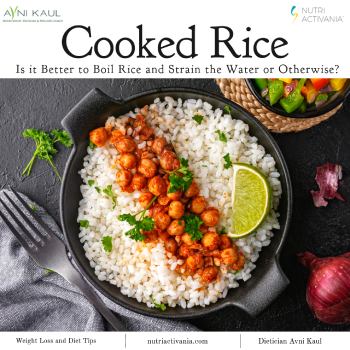
Rice is a staple food in many cultures, and the method of cooking it varies widely across regions and households. One common practice is boiling rice and then straining off the water before serving, known as the parboiling method. Let us explore the considerations behind this technique and whether it is the best approach for your culinary needs as explained by Delhi’s top nutritionist and dietician, Avni Kaul, in this blog.
Deciding whether to boil rice and strain the water or not depends on various factors, including personal preferences, dietary considerations, and culinary goals. It is essential to weigh the potential benefits and drawbacks of parboiling rice against other cooking methods.
While parboiling may offer advantages such as a potentially lower glycemic index and reduced arsenic content, it is essential to be mindful of nutrient loss and longer cooking times. Ultimately, selecting the best method for cooking rice involves considering these factors and choosing the approach that aligns with your priorities and needs.
Whether you opt to strain the water when boiling rice or not, exploring different cooking methods can add diversity to your culinary repertoire and enhance your enjoyment of this versatile grain. Experimentation and adaptation based on individual preferences and dietary requirements are key to mastering the art of cooking rice to perfection.

Avni Kaul is a leading Dietitian & Nutritionist in Delhi NCR and the Founder of Nutri Activania. She holds a Master's Degree in Food and Nutrition from the University of Delhi and is a Certified Diabetes Educator from Project Hope and the International Diabetes Federation.
Her extensive experience includes serving as a Leicester Mamma's Ambassador, trained in Lactation Counselling with the NHS, United Kingdom.
Ms. Kaul specializes in key areas such as Infant and Young Child Feeding Practices, Pre- and Post-natal Diets, Fat Loss, Muscle Gain, and Holistic Health and Nutrition.